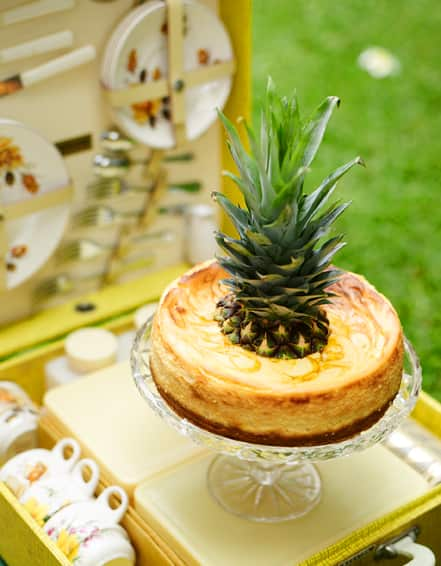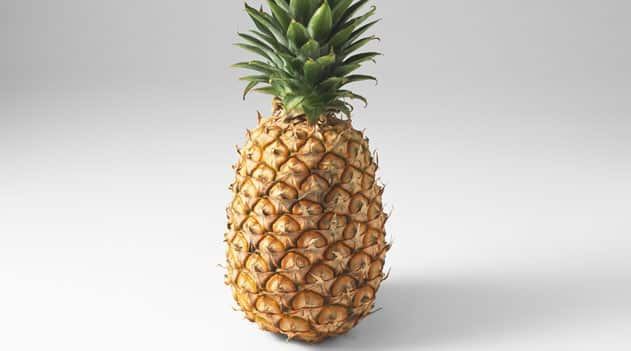Pineapples. The scandalous part of pizzas, the piña to coladas, the shape of many a pool floatie. They are the golden child of the tropical-fruit world, but have you ever experienced a sore mouth from eating them? You’re not the only one.
“After eating pineapple, people may experience a tingling around the mouth, particularly the tongue, lips and cheeks," says Lisa Donaldson, who is an accredited practising dietitian and spokesperson for the Dietitians Association of Australia. "This can increase if consuming a large amount of fresh pineapple.”
It’s all about the bromelain
Fresh pineapples contain a proteolytic enzyme (an enzyme that breaks down protein) called bromelain that’s also used to tenderise meat. Considering your mouth is essentially a big collection of proteins, it’s not surprising that the bromelain affects the mouth.

So, what’s a pineapple lover to do?
“Never fear, the cells regenerate quickly, so the symptoms will not linger too long,” Donaldson says.
It’s also about knowing which parts of your beloved pineapple are less mouth-tenderising than others. While bromelain is present in the fruit, leaves and peel, the core has the highest concentration. Therefore, removing the core can reduce those mouth tingles.
“Bromelain can be decreased in fruit that has been heated,” the dietitian says, so cooking or grilling is a great way to enjoy pineapple (hello Brazilian grilled chilli and cinnamon pineapple).

Donaldson says the canning process also reduces the bromelain levels; however, to keep things on the healthier side, she suggests opting for canned fruit in natural juice rather than a sugary syrup.
Different varieties of pineapples can have varying levels of bromelain, too.

“This phenomena is generally restricted to the old-fashioned smooth cayenne pineapple, which has a higher acid content. They are easy to identify as they are sold with their crowns on and are generally unbranded," says Joe Craggs, co-director of Queensland-based grower, Tropical Pineapples. The new gold varieties are lower acid, are available and taste great all year round. They are sold topless with their crowns removed and are generally branded.”
After the pineapple came to Australia in the 1830s, Australia’s first commercial pineapple industry was established in 1924. From that point, pineapple farms increased in size to cater for Australians’ love of the tropical fruit.
While Australia represents a mere one per cent of the world’s fresh pineapple production, we do love our home-grown produce - almost our entire domestic market is supplied by Australian-grown pineapples.

The best time to eat pineapples
Pineapples are available any time of the year, thanks to the majority of Australia’s 80 commercial pineapple enterprises being based in the perfect pineapple-growing areas of sunny Queensland.
“The new gold varieties are good all year round, but the sugar levels are generally higher in summer,” says Craggs.
“It’s also worth noting that pineapples are picked ripe and ready to eat. They do continue to colour as they age, but are best eaten right away.”

The pros of pineapples
As unnerving as a flesh-eating enzyme sounds, bromelain isn’t all doom and gloom. Bromelain has anti-inflammatory properties, is used to treat soft tissue injuries and a range of other conditions and is being investigated for other potential health uses. You may see it being sold in health food stores in both capsule and tablet form.
And, according to Donaldson: “Pineapples are a great source of vitamin C, manganese and fibre.”
So don’t be afraid of the meat-tenderising effects of bromelain. While it may cause that strange mouthfeel when you’re eating a pineapple, consuming the fruit has plenty of positives – especially when it’s the star of great recipes ranging from roasted piña colada to caramelised pineapple pies.
Love the story? Follow the author here: Twitter and Instagram.
SBS Food is a 24/7 foodie channel for all Australians, with a focus on simple, authentic and everyday food inspiration from cultures everywhere. NSW stream only. Read more about SBS Food
Have a story or comment? Contact Us

